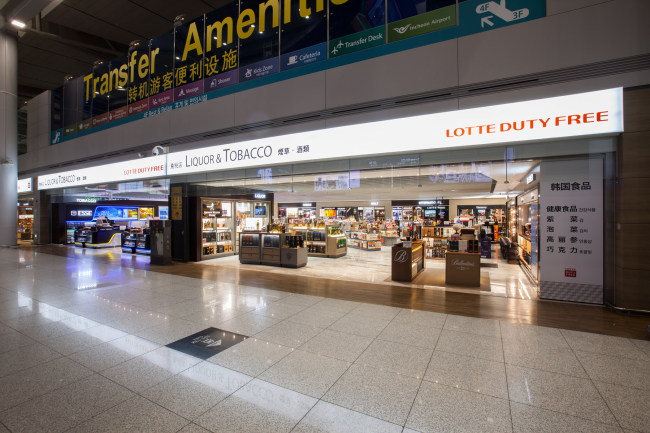According to Lotte Duty Free on Wednesday, the company sent an official letter to Incheon International Airport Corp. asking that the airport adjust its rent prices to be proportional to its sales.
“Right now, we are paying out about 60 percent of our sales revenue from the airport outlet as rent,” said an official with Lotte Duty Free. “If the rent is not adjusted, we really have no choice but to close down those outlets.”
 |
| A Lotte Duty Free shop at Incheon Airport (Lotte Duty Free) |
Based on the current contract, Lotte is due to pay Incheon Airport at least 4.1 trillion won ($3.6 billion) in rent between September 2015 and August 2020.
The contract stipulates that Lotte would pay the company either approximately 30 percent of its sales or the minimum rent, whichever is higher. With falling sales, Lotte says that the minimum rent has become too high and is asking the company to remove the minimum rent.
In the first half of 2017, sales at Lotte Duty Free’s Incheon outlet reached $474.7 million, down 0.3 percent from the same period last year. Between 2015 and 2016, sales at Incheon Airport for the operator had risen 11 percent.
Duty-free store operators have seen sales fall this year, as revenue-driving Chinese tourists turned their back on Korea due to intergovernmental tensions.
If Incheon Airport accepts Lotte’s proposal, industry estimates put rent costs at about 3 trillion won.
Lotte asked the airport corporation to respond within one week. However, the airport corporation currently has no plans to comply with the request.
“The original contract says that the operators are not to request a reduction in rent costs for any reason,” said a spokesperson for the airport corporation. “The rent costs are set according to their own bids. It is up to them to propose a price point that they can handle even in the case of external shock.”
There is a precedent for lowering airport rent costs. In 2008, following the global financial crisis, Incheon Airport lowered rent for all duty-free operators by 10 percent. However, after a later audit, this reduction was found by the government to have been irresponsible and was taxed as entertainment expenses -- implying that the airport corporation gave operators an unnecessary benefit.
“This year from January to August, we actually saw total sales at the airport duty-free stores rise by 2 percent, and the number of shoppers grow by 7 percent,” the spokesman said. “There is no justification for lowering rents at this point.”
With the government as its largest shareholder, Incheon Airport’s profitability is linked to the government’s tax revenue.
Although other operators at the airport including Shilla Duty Free and Shinsegae have not yet made similar moves, they have joined Lotte in meeting with the airport corporation in the past to discuss rent issues.
An industry source predicted that other duty-free store operators would welcome Lotte pulling out of the airport, as they would have the chance to bid for Lotte’s space at a lower price. Lotte currently operates about 60 percent of the space allotted to large operators, according to Incheon Airport.
If major operators such as Lotte pull out from the airport, it could potentially hurt the airport’s reputation as a shopping hub for travelers. Last year, the airport was declared the best airport for duty-free shopping in the world for the sixth consecutive year by Business Traveler.
Its shopping facilities have also contributed to making Incheon the top-ranked airport in the world for 12 consecutive years by the global Airport Service Quality survey.
Incheon Airport is not the only operator that is facing pressure to lower rent prices.
Earlier this year, Hanwha Galleria announced that it would be returning its duty-free license to operate its outlet at Jeju International Airport due to the high burden of rent costs.
By Won Ho-jung (hjwon@heraldcorp.com)






